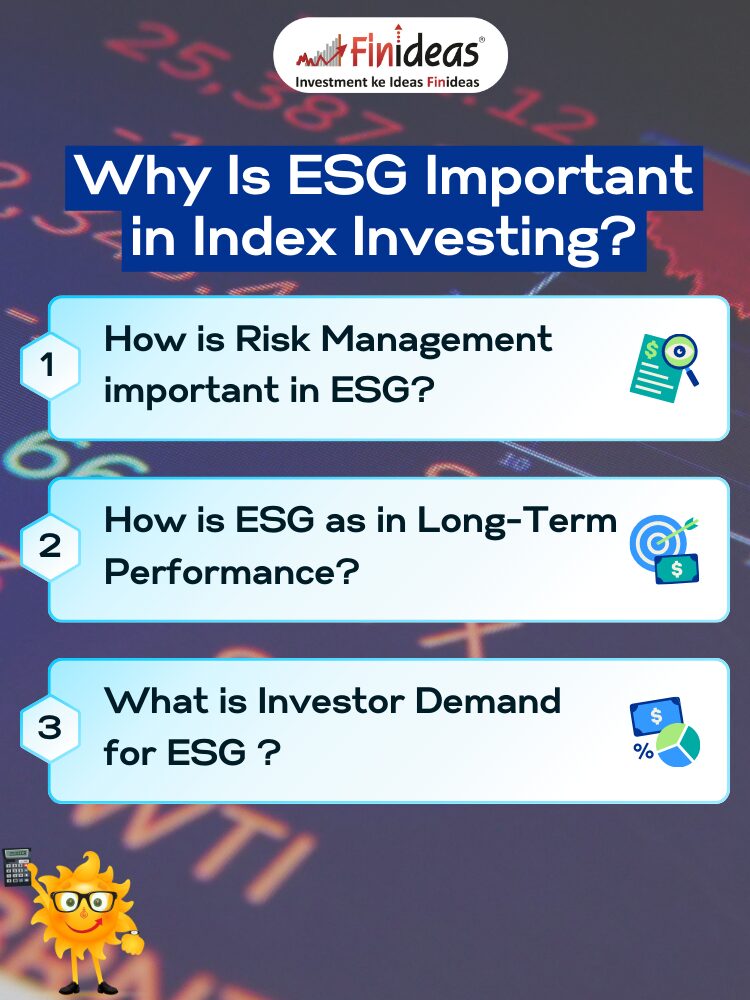Environmental, Social, and Governance (ESG) Criteria in Index Investing
Investing has evolved beyond merely seeking financial returns. Today, many investors are increasingly concerned about the broader impact of their investments, giving rise to the popularity of Environmental, Social, and Governance (ESG) criteria in index investing. ESG investing focuses on companies that adhere to sustainable practices, social responsibility, and ethical governance. Let’s delve into how ESG criteria influence index investing and why it’s gaining traction among investors.
What are ESG Criteria?
ESG criteria are a set of standards for a company’s operations that socially conscious investors use to screen potential investments.
What are Environmental Criteria?
This assesses how a company performs as a steward of nature. It includes a company’s energy use, waste, pollution, natural resource conservation, and animal treatment. For example, companies with initiatives to reduce carbon emissions or manage resources efficiently are rated higher on the environmental scale.What are Social Criteria?
This examines how a company manages relationships with employees, suppliers, customers, and the communities where it operates. Key aspects include company policies on gender and diversity, human rights, consumer protection, and animal welfare.What are Governance Criteria?
This deals with a company’s leadership, executive pay, audits, internal controls, and shareholder rights. Companies that adopt transparent accounting methods and prioritize stakeholder interests typically score higher on governance.
Why Is ESG Important in Index Investing?
Index investing involves creating a portfolio that mimics the components of a financial market index. As investors become more ethically aware, ESG criteria have become an integral part of index construction. Here are some reasons why ESG is crucial in index investing:
How is Risk Management important in ESG?
Companies that adhere to ESG criteria often have better risk management practices. They are less likely to face regulatory penalties, legal issues, and reputational damage. This makes them more stable and less volatile, which is attractive to investors seeking long-term growth.
How is ESG as in Long-Term Performance?
There is growing evidence that companies with strong ESG practices tend to perform better financially over the long term. These companies are often more resilient and adaptive to changing market conditions and consumer preferences.
What is Investor Demand for ESG ?
The demand for ESG-focused investments has surged in recent years. Investors, particularly millennials and institutional investors, prefer to invest in companies that align with their values. This trend has led to the creation of ESG-specific indices and ETFs, providing investors with more options to align their portfolios with their values.
How Are ESG Indices Constructed?
ESG indices are created by selecting companies that meet specific ESG criteria. Here’s a brief overview of the process:
What is Screening?
Companies are screened based on their ESG performance. This can involve positive screening (selecting companies that excel in ESG criteria) or negative screening (excluding companies that perform poorly on ESG metrics, such as those involved in fossil fuels, tobacco, or weapons).
What is Weighting?
In some indices, companies are weighted based on their ESG scores. Higher ESG-rated companies might have a larger representation in the index.
What is Regular Review?
ESG indices are regularly reviewed and updated to ensure they reflect the current ESG performance of companies. This dynamic approach helps maintain the integrity and relevance of the index.
What are the Challenges and Criticisms for ESG Investing?
While ESG investing offers numerous benefits, it also faces challenges and criticisms.
What is Standardization?
One of the primary challenges is the lack of standardized metrics and reporting frameworks for ESG criteria. Different rating agencies may use different methodologies, leading to inconsistent ratings.
What is Greenwashing?
There is a risk of greenwashing, where companies might exaggerate or misrepresent their ESG efforts to attract investors. This makes it difficult for investors to differentiate between genuinely sustainable companies and those merely presenting a façade.
What are Performance Trade-Offs?
Some critics argue that focusing too much on ESG criteria could lead to potential performance trade-offs. By excluding certain industries or companies, ESG investors might miss out on high-performing stocks, affecting overall returns.
What is the Future of ESG in Index Investing?
The future of ESG in index investing looks promising. As regulatory frameworks evolve and ESG reporting becomes more standardized, the transparency and reliability of ESG data are expected to improve. Moreover, as more investors prioritize sustainable and responsible investing, the demand for ESG-focused indices and funds will likely continue to grow.
If you are interested in long term investment then you must know about Index Long Term Strategy.
How important are ESG criteria in your investment decisions, and what factors influence your willingness to invest in ESG-focused indices? Share your thoughts in the comments below!
Environmental, Social, and Governance (ESG) investing represents a significant shift in how we think about investments, balancing financial returns with broader societal impacts. As awareness grows, ESG criteria will undoubtedly play an even more critical role in shaping the investment landscape.
Happy Investing!
This article is for education purpose only. Kindly consult with your financial advisor before doing any kind of investment..


